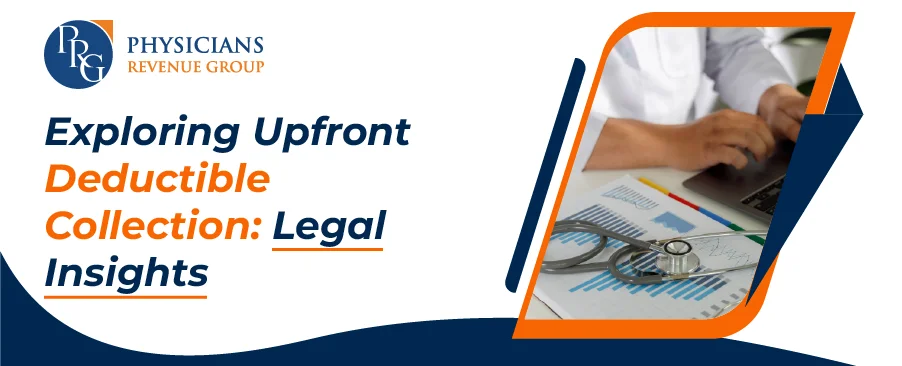
Email: info@prgmd.com | Call: +1 (630) 242-6474
Business hours: 9:00 to 5:00 | Monday to Friday
Email: info@prgmd.com | Call: +1 (630) 242-6474
Business hours: 9:00 to 5:00 | Monday to Friday

Table of Contents
ToggleThe healthcare industry has witnessed skyrocketing average deductible and copay rates in recent years. Furthermore, the upfront deductible collection is necessary, which is made difficult by the inflated costs of operating a medical facility. Additionally, outsourcing medical billing services to a professional provider can help streamline the entire process.
Most patients haven’t yet met their deductible limit at the start of the year. Furthermore, it is important to remember that most insurance plans are renewed at the start of each year. As a healthcare provider, it is time to be extra careful with the beginning of the new year and encourage your patients to check their insurance company’s verifications. Either this, or ask them if they would rather pay themselves.
It is your patients’ choice to decide how to pay for medical services if their insurance company does not cover their bills. The entire scenario becomes a lot easier if you have an experienced team offering front-desk management and medical billing services.
Give constant training and reminders to your staff to clearly express the copay and upfront deductible collection policy. Patients might come with many excuses to delay paying for services. It is advisable to instate automated systems for running patient verification protocols. What this does is assist in the verification of patient information in real time.
Patient information is easily accessible, and that too in mere seconds through EHR systems. With EHRs, you can stay updated and indicate a patient’s state-wise eligibility.
Facilitate your patients with multiple payment options. If and when your patients have deductibles and don’t have cash on them, offer them solutions like:
If your patients quit your office without paying their deductibles, follow up with them. Payment follow-ups can be made by directly contacting them or sending them a reminder via phone calls or patient reports. Remember, unpaid patient deductibles can have a massive effect on the financial health of your practice.
To ensure that you are not losing money, keep your staff well-trained and aware of your practices’ collection policies. Doing so is only possible when your healthcare practice has an efficient billing procedure for upfront deductible collection.
Self-paying or patients with higher deductibles may request a discounted service price. You can entertain such requests for patients who are paying in cash. In contrast, insurance contracts mandate healthcare providers to charge a negotiated fee.
Talk to your patients, establish the insurance rate, and then give them a suitable discount if they pay in full-service time.
It is pertinent to note that you must train employees to arrange and manage payments—work by entering the minimum amount payable at the time of service, along with the maximum payment time. Facilitate your staff to create and then implement special payment arrangements.
Share:
Categories
Recently Added

What is an ABN in medical billing?

What does a Clearinghouse do During Claims Submission?

What is EOR in Medical Billing?
We Would Love to Assist You!
We treat your data confidentially and don’t share any information with a third party.